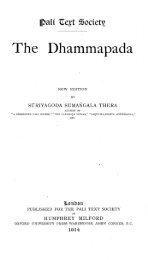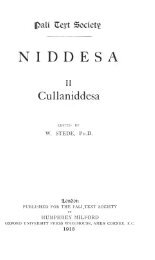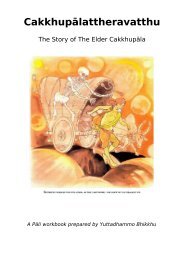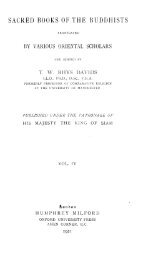Lessons In Practical Buddhism - Sirimangalo.Org
Lessons In Practical Buddhism - Sirimangalo.Org
Lessons In Practical Buddhism - Sirimangalo.Org
You also want an ePaper? Increase the reach of your titles
YUMPU automatically turns print PDFs into web optimized ePapers that Google loves.
suffer as we all do.<br />
It’s interesting to read how some experts in Quantum Physics<br />
have come to the same conclusion in this regard, that the<br />
mind has a moment of interaction with every experience that<br />
can have real consequences in the physical realm. They say<br />
that quantum physics leaves a perfect space for the<br />
experiential mind to interpret the data and make decisions<br />
based on it. They say that with every experience there is a<br />
moment where the mind can intervene and collapse the<br />
quantum state from a smeared-out series of possibilities to a<br />
specific state, a decision. This is very close to the<br />
description of karma in <strong>Buddhism</strong>, and it’s very close to what<br />
is experienced in Buddhist meditation. It is quite impressive<br />
to see that what we realize in meditation is being explained<br />
in terms of modern Physics, where they can describe how it<br />
appears from the outside and we can verify it from within.<br />
According to Buddhist theory, this intervention of the mind<br />
occurs at every moment; every time we experience an<br />
object, there is a mental interaction with the otherwise<br />
closed physical reality. Normally, the physical realm works<br />
according to internal laws of cause and effect; X causes Y<br />
causes Z and so on. When the mind intervenes, however,<br />
it’s able to change this, or to play a part in it at least.<br />
Though there is much debate amongst Physicists about<br />
whether this is so, it is quite clear from the point of view of a<br />
Buddhist meditator that we give rise to judgements and<br />
make decisions on a moment to moment basis. <strong>In</strong> the<br />
practice of mindfulness, we attempt to purify our mental<br />
state at the moment at which the intervention would occur,<br />
remembering it simply for what it is. When we see<br />
something, we attempt to see it clearly; we attempt to purify<br />
our awareness in that moment, so there is no greed, no<br />
anger and no delusion, just pure awareness of the object as<br />
it is.<br />
We always hear in <strong>Buddhism</strong> about how one should stay in<br />
the present moment, not thinking about the future, not<br />
thinking about the past. This is not just a clever aphorism,<br />
it’s actually a meditation instruction; you should be<br />
meditating right now on what you experience in the present<br />
moment. It doesn’t do any good to think in terms of how<br />
70












